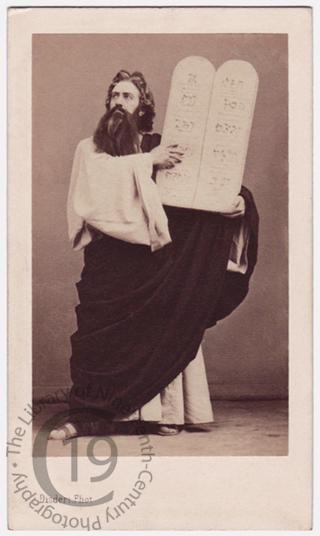
Louis-Henri Obin as 'Moses'
A carte-de-visite portrait of Louis-Henri Obin (1820-1895) dressed for the role of Moses in Rossini's Moïse et Pharaon, ou, Le Passage de la Mer Rouge.
Born in 1820, lyric bass Louis-Henri Obin began his voice training at the conservatory in Lille, and then continued at the Paris conservatory under the direction of the tenor Louis-Antoine Ponchard, who taught amongst others Henri-Bernard Dabadie, Jean Baptiste Faure, Giovanni Mario, Rosine Stoltz and Jean Baptiste Weckerlin.
His début on the stage was on 6 December 1844 at the Grand Opéra in Paris, in the role of Lord Seyton for the creation of the opera Marie Stuart by Niedermeyer (Some references place his début in September of the same year as Brabanio in Rossini’s Otello).
Before the retirement from the stage of the first bass Nicolas-Prosper Levasseur in 1852, Obin participated in two more creations in a secondary role. On 6 December 1850 he sang Bocchoris at the Opéra-Comique in Auber’s L'Enfant prodigue, and on 23 April 1852 he sang Nicéphore in Halevy’s Le Juif errant. After he had taken over as first bass, on 2 May 1853 he created the role of the Duc de Beaufort in Niedermeyer’s Le Fronde, followed on 17 October 1853 by the title role in Le Maître Chanteur by Armand Limnander. On 9 December 1853 he was Basile in the French adaptation of Rossini’s Barbier de Seville (the adaptation was only staged once due to the opposition of the director of the Théâtre Italien).
It is, however, from 1855 on that he left his real mark on the history of opera, with the creation on 13 June of the first Grand Opéra à la Française written by Verdi specifically for Paris, Les Vêspres Siciliennes, in which he took the role of Procida. He followed this on 4 March 1859 with the première of Felicien David’s Herculanum and then on the 9 March 1860 with Pierre de Medicis, composed by the Polish prince Josef Poniatowski, a work which enjoyed an enormous success in its time.
On 28 April 1865 he took part in the première of Meyerbeer’s L'Africaine, which such other Parisian greats of the age as Marie Saxe, Marie Battu, Emilio Naudin et Jean-Baptiste Fauré. On 11 March 1867, he created the role of Philippe II in Verdi’s last great Parisian opera Don Carlos, with Marie Saxe as Elisabeth de Valois and Jean-Baptiste Fauré as Rodrigue.
Apart from the creation of so many important roles, Obin also sang in numerous other works that were part of the repertory of the day, in particular the title roles in Don Giovanni and Moïse et Pharaon.
Photographed by Disdéri of Paris.
Code: 123101




